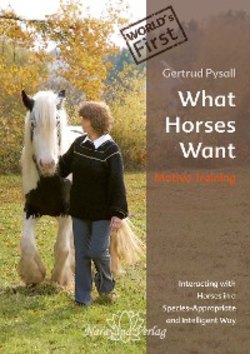Читать книгу What Horses Want - Gertrud Pysall - Страница 11
ОглавлениеI. THEORY
1. THE HORSE IN HUMAN HANDS
1. The Horse in Human Hands
When Manfred Pysall and I first came to our farm in North Rhine-Westphalia (NRW), we found it to be an ordinary equestrian centre with the type of customers we were familiar with from our past professional experience. Western riders mixed and competed with English riders. After a settling-in period during which we observed the horse owners and riders, we established some new rules. One of these rules was that on our farm, horses must not be beaten. We also prohibited certain methods which are used to train horses by inflicting pain. Before long, some people were looking for a different riding centre where they could continue to train using the methods they were accustomed to.
Over the course of time, I was able to observe a very interesting phenomenon. It happens all the time: new people come to the farm and are struck by the atmosphere, the peace and quiet, the happy horses; they describe it as being in an oasis. It is very healthy for them not to experience fear and aggression when interacting with horses and to learn that there is no need for it at all. Our horses, trained in a very different way, are easy to ride, are very content and radiate calm and trust. Almost everyone enjoys this.
However, as soon as these people realise that the rejection of traditional training methods also means they have to reflect upon their thoughts and actions, to improve and to retrain, some of them decide to switch stables. Even though they are fascinated by our philosophy, they are not always able to overcome their inner obstacles, a process which requires critical self-examination and sometimes changes in attitudes and behaviour. It is much easier to think that only the horse has to learn and change - not the human.
Freya
THE SECRET OF HONESTY
In Germany, horses became popular as a hobby or as a luxury commodity from the 1950s onwards. As riding or owning horses became more affordable, the number of horse owners and riders increased. The different characteristics and traits of horses have not changed, however, even though the human requirements have. Horses are now no longer livestock, but may substitute for a partner or a child or a cuddly toy. They can be status symbols or compensate for other deficiencies in the lives of humans. Any of the roles humans assign to horses fundamentally benefit the former. A horse represents something to humans, something they are looking for or believe they need. If they do not find it among their own kind, they use the horse as a substitute and lo and behold, it works. Horses can give us a lot emotionally. That is why they are, you could say, the ideal therapist in difficult times. They are always there, big and strong, they love us, carry us and wait for us; they are reliable.
